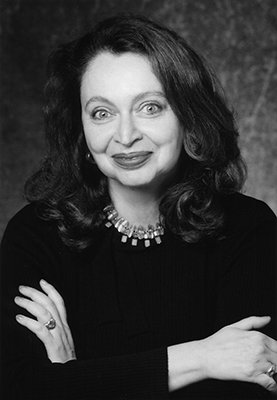
Liliane Weissberg
Twenty years ago, memories of the Holocaust were too painful for Liliane Weissberg’s parents to give their testimonies to USC Shoah Foundation’s Visual History Archive. But Weissberg herself has taken on the mantle of studying and remembering the Holocaust as a professor at the University of Pennsylvania and USC Shoah Foundation’s next Rutman Teaching Fellow.
The Rutman Teaching Fellowship provides summer support for one member of the University of Pennsylvania faculty to integrate the Institute’s testimonies into a new or modified existing course. She will also give lectures at USC and Penn about her research.
For a long time, Weissberg said, she was hesitant to do scholarly work related to the Holocaust. Her parents, both survivors, had struggled to make lives for themselves in post-war Vienna and Frankfurt, and encouraged her and her sister to emigrate. Only after Weissberg had gained geographical distance from her family’s past and spent time studying other topics, including American literature and culture, early modern German philosophy, and the history of German speaking Jews in the 18th and 19th centuries, was she able to start focusing on 20th century German Jewish history and culture.
At Penn, Weissberg is Professor of German and Comparative Literature and an affiliated faculty member of the Alice Paul Center for Research on Women, Gender and Sexuality. She has written essays on the US Holocaust Memorial Museum, Holocaust memorial sites in Germany and elsewhere, and individual figures such as Charlotte Salomon, a German visual artist who perished in a camp. She has also written about Claude Lanzmann’s Shoah and on Steven Spielberg’s Schindler’s List and its German reception.
At Penn (where she is Christopher H. Browne Distinguished Professor in Arts and Science), as well as universities in Germany, Austria, and Switzerland, she has taught courses on the relationship between trauma and memory, and thinkers who have written on the Holocaust and the persecution of Jews such as Hannah Arendt and Karl Löwith.
Weissberg said the Rutman Teaching Fellowship will make it possible for her to study the Visual History Archive for the first time and integrate testimony into her research and teaching with the help of USC Shoah Foundation staff.
“My interest in using the Visual History Archive is a scholarly one, but I am motivated by my personal experiences as well – as is often the case with productive scholarship,” Weissberg said. “There is much that I would like – and need – to understand.”
During the fellowship, she will prepare for a lecture course she will teach in spring 2016 called “Witnessing, Remembering, and Writing the Holocaust,” which is intended for undergraduates of all majors. It draws on her interest in memory, writing and the role of the witness, and will incorporate literary sources as well as the Visual History Archive.
Weissberg said it is important for students to understand survivors’ experiences not only during the war, but also their lives afterward and how they were able to rebuild. “Somehow, they were able to accept life in various ways, and pass on moral values and guidelines for a human future,” she said.
She wants the testimonies to provide her students access to personal stories that go beyond what can be learned in history books.
“In many courses on the Shoah, students learn about the victims who died; few learn about those who have survived,” Weissberg said. “Those who perished, and those who escaped persecution, were individuals. It is important to hear human voices, and learn about their distinct lives.”